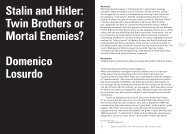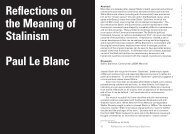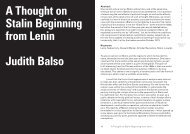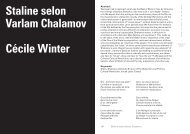adrian
adrian
adrian
- No tags were found...
You also want an ePaper? Increase the reach of your titles
YUMPU automatically turns print PDFs into web optimized ePapers that Google loves.
that are themselves immanent realizations of logical concepts andcategories. For Hegel, and pace metaphysical realism, the metaphysicalby itself is not the real. Therefore, the Logic is a beginning strictlyin the circumscribed sense of laying down the skeletal metaphysicalabstractions serving as necessary conditions/ingredients for anontology of intelligible being(s)—with this “-logy” formulated at adeterminate point of spiritual history from the contextually situatedstandpoint of philosophy’s backwards glance (à la the Owl of Minerva)as itself invariably embodied in individual human creatures of nature(as well as culture). These qualifications I just now attached to thelogical beginning of Hegel’s absolute idealism already hint at thedifferent priorities belonging to the two fundamental dimensions ofRealphilosophie, those of Natur und Geist.One of the accomplishments of the Phenomenology of Spirit,Science of Logic, and Encyclopedia Logic taken together is that theypermit Hegel to posit real beginnings both material/natural (as inRealphilosophie als Naturphilosophie) as well as historical/mental(as in Realphilosophie als Geistesphilosophie) in thoroughly nondogmatic,post-critical ways. In particular, not only does HegelianLogic make possible knowledge of the Real à la the Realphilosophie(as real knowledge 122 )—it also argumentatively supports Hegel’srealism generally (by immanently critiquing such anti-realist optionsas Kantian transcendental idealism) and his beginning, at the startof the Philosophy of Nature, with space and time as objectively realspecifically. The course of Hegel’s mature Logic begins with Being andends with the transition to Nature (with the latter as external to thinking,including the thinking of/about thinking that is the Logic itself). Thisis significant, especially considering that Hegel, as I noted a whileago, proclaims the structure of his Logic to be circular, with the endreconnecting (somehow or other) with the beginning. Of course, theLogic initially gets underway with the attempt to start with Being fromwithin pure thinking. Hence, its conclusion, as a neither temporal norcausal move from the Logical to the Real of Nature as an externality inexcess of pure thinking, entails that the “onto-” in ontology really is to befound over and above a “-logy” alone, namely, in Natur an sich.If I am right in reading the entire Logic as a series of false starts,then it becomes a failed ontology. However, surprisingly, its failure isepistemologically productive. Inaugurated without presuppositionsCRISIS&CRITIQUE#3and set in motion with the self-induced dialectics of the attempt tobegin with mere, sheer Being per se, the Logic keeps failing properlyto begin. The sequence of failures to begin inexorably drives thoughtup to the point of thinking Nature’s externality, ready to do so equippedwith the conceptual and categorial resources generated preciselyby the sublimely, stunningly productive failures, as “determinatenegations,” 123 constituting the full sweep of the Logic. With the Logic’scircularity, this means that Being, its false start, is truly recovered firstas spatio-temporal objective reality (i.e., the start of Realphilosophiewith Natur), an intelligible reality whose intelligibility is made possibleby the Logic itself (as a metaphysical, but not yet real, beginning).Therefore, the Philosophy of Nature can be construed as furnishing asecond beginning for Hegel’s System, that is, its material preconditions/presuppositions.Finally, and as the deservedly renowned preface to Hegel’s 1821Elements of the Philosophy of Right powerfully proposes, philosophygenerally and Hegelian systematic, scientific philosophy specifically isinvariably and inevitably a “child of its time,” namely, constructed fromthe perspective of the backwards glance of the Owl of Minerva. 124 Inthis sense, what I am here identifying as the third, historical beginningof Hegelian Wissenschaft, in addition to the other two beginningsmetaphysical (with Logik) and material (with Naturphilosophie), enjoysthe priority of embodying the spiritual-contextual starting pointsconditioning Hegel’s philosophy überhaupt. As the introductory“First Part” of a “System of Science,” the Phenomenology of Spirit,particularly with its glaringly prominent socio-historical components,already hints, well before 1821, that both Logik and Realphilosophie(i.e., the entirety of the encyclopedic nucleus of the System) are actualand possible only insofar as the history of human mindedness andlike-mindedness has eventuated in Hegel-the-philosopher’s particularearly-nineteenth-century European time and place. 125 However, althoughHegel posits such conjunctural/situational presuppositions as (pre)conditions of his philosophy as well as philosophy tout court, henonetheless avoids crudely and unreservedly reducing the philosophicalto the historical. For instance, his own Logic, Philosophy of Nature, and123 Hegel 1977c, p. 36; Hegel 1969a, pp. 54-56, 106-107; Hegel 1991c, §82 (pp. 131-132).CRISIS&CRITIQUE#3124 Hegel 1991a, pp. 20-23.122 Hegel 1977c, p. 3.125 Hegel 1977c, pp. 6-7; Hegel 1956, pp. 446-447; Hegel 1955b, pp. 546-548, 551-552.408 “Where to Start?: Robert Pippin, Slavoj Žižek...409“Where to Start?: Robert Pippin, Slavoj Žižek...






